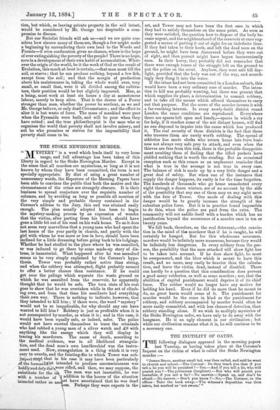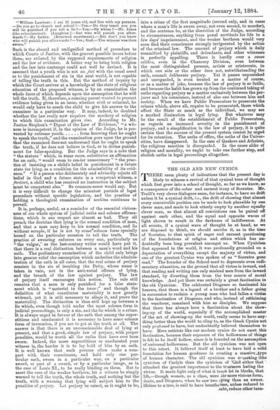THE INUTILITY OF OATHS. T HE following dialogues appeared in the
morning papers last Tuesday, as having taken place at the Coroner's Inquest on the victim of what is called the Stoke Newington murder :- "lames Brace, another small lad, was.then called, and said he went to church and school.—The Coroner : Do they teach you that if you tell a lie you will be punished ?—Yee.—And if you tell a lie, who will punish you P—The policeman (laughter).—But who will punish you hereafter, if you tell a lie ?—No answer.—Speak up, and don't be afraid.—No answer.—Don't you know 14L—No.—The Coroner, to the officer : Take the book away.—The witness's deposition was then taken, but marked as 'not sworn."
" William Lambert : I am 11 years old, and live with my parents. —Do you go to church and school ?—Yes.—Do they teach you you will be punished if you tell a lie ?—Yes.—By whom ?-3fr. Jones (the schoolmaster). (Laughter.)—But who will punish you after- wards ?-3,1y father. (Renewed merriment).—Bat don't you know who will punish you afterwards ?—Yes; God.—The witness was then sworn."
Such is the absurd and undignified method of procedure to which Courts of Justice, with the gravest possible issues before them, are reduced by the supposed requirements of religion and the law of evidence. A better way to bring both religion and the law into contempt could not well be devised. It is assumed that a youth who is not au fait with the usual creed as to the punishment of sin in the next world, is not capable of telling the truth in this. But the method of inquiry by which the Court arrives at a knowledge of the state of religious education of the proposed witness, is by an examination the whole force of which depends upon the assumption that he will tell the truth. If, therefore, a cunning parent wanted to prevent evidence being given in an issue, whether civil or criminal, he would only have to coach the child to give his answer to the examiner in a particular way. It may, indeed, be doubted whether the law really now requires the mockery of religion to which this examination gives rise. According to Mr. Justice Stephen's " Digest of the Law of Evidence," " a wit- ness is incompetent if, in the opinion of the Judge, he is pre- vented by extreme youth from knowing that he ought to speak the truth," and the examination goes upon the ground that the examined does not understand that he ought to speak the truth, if he does not believe in God, or in divine punish- ment for false-speaking. But the Judge says in a note that " the statute " which, in some cases, substitutes an affirmation for an oath, " would seem to render unnecessary" " the prac- tice of insisting on a child's belief in punishment in a future state for lying, as a condition for the admissibility of its evid- ence." "If a person who deliberately and advisedly rejects all belief in God and a future state is a competent witness, a fortiori, a child who has received no instruction in the subject must be competent also." So common-sense would say. But it is very difficult to change the minutest particle of legal procedure without specific legislation, and the practice of holding a theological examination of urchins continues to prevail.
It is, perhaps, useful, as a reminder of the essential vicious- ness of our whole system of judicial oaths and solemn affirma- tions, which in one respect are almost as bad. They all preach the doctrine that lying is the normal condition of man, and that a man may keep to his normal condition, and lie without scruple, if he is not by somesolemn form specially
bound on the particular occasion to tell the truth. The practice of swearing enforces on every one, particularly on " the vulgar," as the last-century writer would have put it, that there is a real distinction between a man's word and his oath. The preliminary examination of the child only brings into greater relief the assumption which underlies the adminis- tration of the oath in all cases, that the real crime of perjury consists in the sin of insulting the Deity, whose name is taken in vain, not in the anti-social offence of lying, and the breach of the law against perjury. The law of perjury itself encourages this notion. The rule still remains that a man is only punished for a false state- ment which is " material to the issue ;" and though the definition of what constitutes materiality is now greatly widened, yet it is still necessary to allege it, and prove the materiality. The distinction is thus still kept up between a lie which, even though told under the most solemn form in judicial proceedings, is only a sin, and the lie which is a crime. It is always urged in favour of the oath that among the super- stitious and uneducated it is necessary to have some solemn form of invocation, if you are to get at the truth at all. The answer is that there is an unconscionable deal of lying at present, and that a good, simple law of perjury, with proper penalties, would be worth all the oaths that have ever been sworn. Indeed, the more superstitious or uneducated your witness is, the harder it is to lay hold of him by an oath. It is well known that such persons often make a com- pact with their consciences, and hold only one par- ticular oath, sworn in a particular way, on a particular sword, or part of a sword, or by a particular image, as in the case of Louis XL, to be really binding on them. But to meet the case of the weaker brethren, let a witness be simply warned to tell the truth, the whole truth, and nothing but the truth, with a warning that lying will subject him to the penalties of perjury. Let perjury be raised, as it ought to be, into a crime of the first magnitude (second only, and in cases where a man's life is sworn away, not even second, to murder), and the sentence be, at the discretion of the Judge, according to circumstances, anything from penal servitude for life to a few days' imprisonment, and the weaker brethren would very soon find their consciences strongly invigorated by the action of the criminal law. The amount of perjury which is daily committed by plaintiffs, and defendants, and other witnesses is perfectly appalling. There is hardly ever a cause ce'abre, even in the Chancery Division, even between the most distinguished persons, artists or aristocrats, in which one side or the other does not, notwithstanding the oath, commit deliberate perjury. Yet it passes unpunished and unregarded, is even treated as a matter of course, or as a matter of joke, because the law of perjury is so futile, and because the habit has grown up from the continued taking of oaths regarding perjury as a matter exclusively between the per- jurer and his conscience, instead of also one between him and society. When we have Public Prosecutors to prosecute the crimes which, above all, require to be prosecuted, those which affect the State as much as the individual, we may see a marked diminution in legal lying. But whatever may be the result of the establishment of Public Prosecutors, as regards an increased severity .in the punishment of perjury, and a simplification in the law of perjury, it is quite certain that the success of the present system cannot be urged for its retention. The oaths of office, the oaths of the Univer- sities, have disappeared. In the case of Quakers and Atheists, the religious sanction is disregarded. In the cause alike of religion and morality, we ought to take one further step, and abolish oaths in legal proceedings altogether.







































 Previous page
Previous page